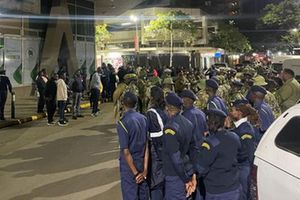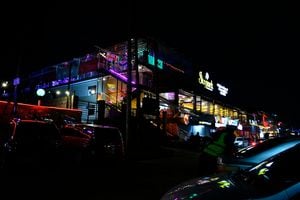
County security teams were told to implement a shutdown and seizure of premises that cause noise pollution with immediate effect.
Tackling the cacophony charactering residential areas in Nairobi especially on Friday nights and Sunday daytime courtesy of mushrooming churches, goes beyond raiding nightclubs once in a blue-moon.
The laxity comes from officials who have chosen to bury their heads in the sand with entities such as the Nairobi Liquor Board and the county’s environment enforcement department engaging in a blame game instead of addressing the plight of Kenyans suffering from noise pollution.
Why is Nairobi prone to noise pollution?
According to county environment enforcement officials, urban areas grapple with the menace due to high population density and heavy traffic.
The World Health Organisation (WHO) says noise pollution can cause sleep disturbances, impair hearing among other health issues.
This is why in 1972, it came up with the pyramid of noise effects.
At the bottom sits feeling of discomfort which includes annoyance and sleep disruption followed by stress indicators such as autonomous response and stress hormones which is followed by risk factors such as blood pressure cholesterol, blood clotting and glucose closed trailed by diseases such as insomnia and cardiovascular issued while at the top of the echelon sits mortality.
According to the National Environmental Management Authority (Nema), every person has a right to live in a serene surrounding free from excessive noise.
The authority says a facility or an activity should not exceed the allowable sound levels, and should provide mitigation measures in case of excessive decibels. Nema says this is why noise control is a devolved environmental function. “However, the oversight role still remains with Nema,” the authority states on its official website.
To gauge just how much noise is being emitted by entities, Nema has established limits for different types of areas.
They range from 50 decibels (dB) in residential areas to 70 dB in industrial areas during daytime, and 45 dB to 60 dB respectively at night.
In sensitive areas such as hospitals and schools, the daytime limit is set at 55 dB.
The maximum allowed noise level for a vehicle is 80 dB, and for a construction site, it is 65 dB during the daytime and 60 dB at night.
This is after the International Organisation for Standardisation (ISO) developed several norms related to noise, including ISO 1996-1, which outlines methods for measuring noise levels and assessing their impact on people.
ISO 1996-2 provides guidance on the design of noise barriers and other noise control measures.
To mitigate the harmful effects of noise, many countries have established international standards and regulations for control.
Kenya is no exception.
County governments enforce noise regulations by slapping offenders with fines and other penalties. They can also establish noise control programmes and work with stakeholders to develop mitigation measures.
Nairobi county government has established noise limits for different areas including residential, commercial, and industrial areas.
It is supposed to fully implement noise control measures apart from religiously encouraging businesses and individuals to reduce their emissions.
Does it do so?
Nema asks Kenyans not to allow loud, unreasonable, unnecessary or unusual noise which annoys, disturbs, injures or disturbs their comfort, repose, health or safety of others and the environment.
“Report noise related incidents to your county government,” the authority urges while also pointing out that counties may grant a person a temporary permit allowing emission of noise in excess of established standards for such activities as fireworks, demolitions and firing ranges.
What should business entities do to ensure they are not a nuisance to Kenyans who just want to enjoy the peace and comfort of their homes?
Soundproofing helps in eliminating or minimising transmission of sound from one area to another.
It is becoming increasingly popular as demand for quieter living and work environments grows in Nairobi. The most common methods used for soundproofing include acoustic panels, sound barriers, and soundproof windows and doors.
These are designed to absorb or block sound waves, creating a more peaceful environment.
Soundproofing materials and services are widely available and the cost varies depending on the size and complexity of an entity.
New far-reaching measures by the government aimed at eradicating illicit brews, drugs and substance abuse in the country will also help in lowering the levels of noise pollution in the country.
Last week, a meeting convened by Deputy President Rigathi Gachagua of all regional and County National Government Administration Officers (Ngao), and Security Teams, including County Police Commanders from the Kenya Police Service, Administration Police Service and Directorate of Criminal Investigations resolved that any licences currently issued to bars and other outlets and premises by devolved units that are contrary to the provisions of the Alcoholic Drinks Control Act, especially as relates to licensing of premises within residential areas and around basic educational institutions are null and void.
County security teams were told to implement a shutdown and seizure of such premises with immediate effect.
On Monday, Zipporah Njeri Mwangi, Nairobi County's Chief Officer-Business and Hustler Opportunities, did not answer Nation's questions on how Jiranis Bistro had illegally obtained a licence to operate in a residential area in the first place.
However, three hours later, the senior officer in charge of issuing business permits sent the Nation a photo of her closing Jiranis before calling to say, "We have closed Jiranis Bistro this afternoon because we have found that they are not in compliance, they have to comply with certain measures like soundproofing to be allowed to operate."
However, an official in her office, who is not authorised to speak, revealed to the Nation that Jiranis Bistro never had a licence to begin with, which is why it was shut down immediately to avoid further scrutiny.
But how does an unlicensed nightclub operating illegally in an unlicensed residential area come to be closed "until further notice"? Ms Mwangi did not explain.
When the Nation sent her eight follow-up questions, highlighting the concerns of Kenyans currently kept awake all night by the endless noise pollution in Kenya's capital emanating from nightclubs, she refused to answer any of them.
She did not answer any of them and did not return our calls.
We wanted to know why more than eight of the nightclubs that were deregistered by the Nairobi County Liquor Licensing Board in November 2022 according to our investigations due to noise pollution have reopened and are currently making much more noise than ever before.
Again, nothing has been done despite Kenyans filing new official complaints with the authorities.
On churches such as PCEA Gateway Parish and mosques operating illegally in residential areas, county officials completely refused to speak to the Nation about it, with one suggesting that the church was 'untouchable and a no go zone'.
This is despite the fact that the Nation gave all officials five days, including eight hours before going to press, to respond.









